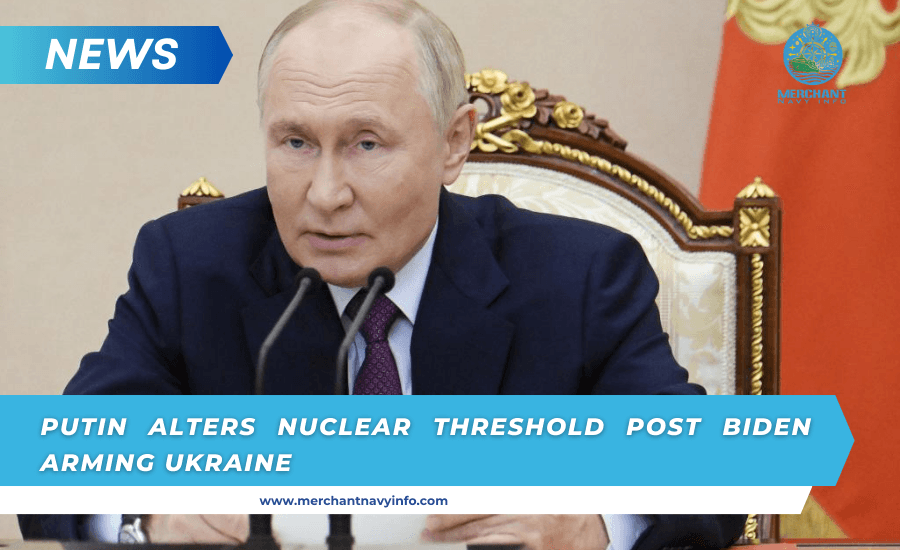
Putin Lowers Threshold For Using Nuclear Arsenal After Biden Decision To Arm Ukraine
Russian President Vladimir Putin on Tuesday formally lowered Russia’s threshold for using nuclear weapons after U.S. President Joe Biden decided to allow Ukraine to strike targets inside Russia using long-range missiles provided by the United States.
The new doctrine allows Moscow to respond nuclearly even to a conventional attack on Russia by any country with nuclear-backed forces.
Ukraine fired six U.S.-made ATACMS missiles at a Russian military facility in the Bryansk region bordering Ukraine early Tuesday, the Russian Defense Ministry said, adding that air defenses shot down five of the missiles and damaged one. The Ukrainian military claimed the attack hit a Russian ammunition depot.
While the doctrine envisions that Russia could respond nuclear to such a conventional strike, it was drafted to avoid a firm commitment to use nuclear weapons and to leave Putin’s options open.
Russian Foreign Minister Sergey Lavrov stressed that Ukraine’s attack on Bryansk was an escalation and urged the United States and other Western allies to study modern nuclear doctrine.
Lavrov said on the sidelines of the G20 meeting in Brazil but did not give details: “If long-range missiles are used from Ukraine against Russian territory, it means that they are under the control of American military experts. We will regard this as a new stage in the West’s war against Russia and respond under “so”.
The approval of the document shows that Putin is willing to use his nuclear arsenal to force concessions from the West, and Moscow is in. The slow-moving offensive against Ukraine comes as the war there enters its 1,000th day.
When Kremlin spokesman Dmitry Peskov was asked on Tuesday whether an attack by Ukraine using long-range U.S. missiles could trigger a nuclear response, he answered in the affirmative, noting that the doctrine’s provisions open the door to a conventional strike after it poses a serious threat to the “sovereignty and territorial integrity” of Russia and its ally Belarus.
Commenting on whether the updated doctrine was deliberately released to follow Biden’s decision, Peskov said the document was released “in a timely manner” and that Putin instructed the government to update it earlier this year to be “compatible with the current situation.”
Beijing first announced the revision of nuclear doctrine in September when he hosted a meeting to discuss the proposed revisions. He had previously warned the United States and other NATO allies that allowing Ukraine to use Western long-range weapons to attack Russian territory would mean Russia and NATO would be drawn into war.
Washington allowed Ukraine to use long-range weapons against targets inside Russia after announcing the deployment of thousands of North Korean soldiers in Russia‘s Kursk region to counter an incursion by Kyiv’s army.
A U.S. National Security Council official, who was not authorized to comment publicly and requested anonymity, said White House officials were not surprised by Putin’s decision and that the United States had not seen any change in Russia’s nuclear posture.
The official added that As a result, the Biden administration “sees no reason to change our nuclear posture or doctrine in response to Russia’s statement today.” However, the official said the White House considered it “irresponsible remarks.”
But the official stressed that the arrival of thousands of North Korean troops to take part in combat operations against Ukraine was a major escalation on the part of Moscow that required a response.
British Prime Minister Keir Starmer condemned the revised nuclear doctrine as “the latest example of irresponsibility” by the “corrupt Russian government,” said his spokeswoman Camilla Marshall.
“It is Russia that continues to escalate this war, and the use of North Korean troops is just one example of that,” Marshall said. “He can withdraw his troops, withdraw his tanks, end the offensive and the unnecessary bloodshed in Ukraine and Russia… We urge him to do that.”
German Foreign Minister Baerbock said in Warsaw that Russia’s new policy would not intimidate Germany. She said her country had made the mistake of retreating in the past in the face of Moscow’s aggression but would not do so again.
The updated doctrine states that any attack on Russia “with the participation or support of a nuclear power” would be considered a “joint attack on the Russian Federation.”
It says any large-scale air strike against Russia could trigger a nuclear response but avoids making any hard commitments, noting that “uncertainties exist about the scope, timing and location of the potential use of nuclear deterrence” in the core principle of nuclear deterrence.
The document also states that aggression against Russia by a military bloc or alliance member is considered “aggression against the entire bloc,” an apparent reference to NATO.
At the same time, it lays out the conditions for the use of nuclear weapons in greater detail than previous versions of the doctrine, noting that they could be used in the event of a large-scale air strike involving ballistic missiles, cruise missiles, aircraft, and drones.
The wording appears to significantly expand the reasons for the possible use of nuclear weapons compared to previous versions of the document, which said Russia could resort to its atomic arsenal in the event of a ballistic missile attack.
President Alexander Lukashenko has ruled Belarus with an iron fist for more than three decades, relying on Russian support and backing to allow Russia to use its national territory to send troops to Ukraine and deploy some tactical nuclear weapons.
Since Putin sent troops into Ukraine, he and other Russian voices have been threatening the West with Russia’s nuclear arsenal to prevent it from increasing support for Kiev.
Russian hawks have been calling for months to strengthen the principle, saying that previous versions failed to prevent the West from increasing aid to Ukraine and gave the impression that Moscow would not resort to nuclear weapons.









